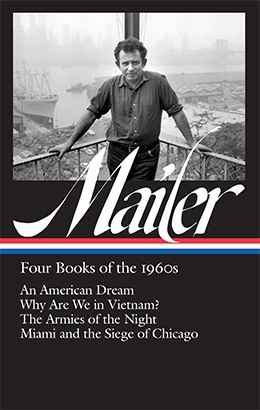Four Books Of The 1960s
An American Dream / Why Are We in Vietnam? / The Armies of the Night / Miami and the Siege of Chicago

Editorial Library Of America
Fecha de edición marzo 2018 · Edición nº 1
Idioma inglés
EAN 9781598535587
926 páginas
Libro
encuadernado en tapa dura
Resumen del libro
No writer plunged more vigorously into the chaotic energies of the 1960s than Norman Mailer, fearlessly revolutionizing literary norms and genres to capture the decade's political, social, and sexual explosions. Declaring himself to have the mind of an outlaw, he adhered closely to his own vision of what it meant to be a writer. In a way uniquely his own, he merged the public and the private, the personal and the political, taking risks with every sentence. Here, for the first time in a single volume, are four of his most extraordinary works.
War hero, television star, existential hipster, seducer, murderer: such is Stephen Rojack, the hero of An American Dream (1965), Mailer's hallucinatory voyage through the dark night of an America awash in money, sex, and violence. Mailer challenged himself by serializing the book while he was still writing it, an approach he compared to ten-second chess. The result is a fever dream of a novel, navigating through the most extreme fears and fantasies of a culture hooked on power. In Why Are We in Vietnam? (1967) a motor-mouthed eighteen-year-old Texan on the eve of military service recounts an exclusive grizzly bear hunt in Alaska with an obscene exuberance that finally comes close to horror. Although the word Vietnam appears only on the book's final page, the whole work is imbued with a sense of frantic bloodthirstiness that exposes the macho roots of the war.
With the acclaimed non-fiction novel The Armies of the Night (1968), an account of the October 1967 anti-Vietnam War march on the Pentagon, Mailer brought a new approach to journalism, casting himself ( he would have been admirable, except that he was an absolute egomaniac, a Beast ) as a player in the drama as he reported, alongside a stunning gallery of student activists, politicians, intellectuals, and policemen. Winning both the Pulitzer Prize and National Book Award, The Armies of the Night immediately established itself as an essential record of its moment.
In Miami and the Siege of Chicago (1968) Mailer continued his eyewitness chronicle of American political life, embedding himself at the 1968 Republican and Democratic presidential conventions and drawing unforgettable portraits of Richard Nixon, Nelson Rockefeller, Lyndon Johnson, Eugene McCarthy, and many others. His reading of the nation's political undercurrents continues to surprise with its relevance.
Biografía del autor
x{0026}lt;p x{0026}lt;strong Norman Mailerx{0026}lt;/strong (1923-2007) ha sido uno de los mayores escritores norteamericanos contemporáneos, así como una figura central en el panorama cultural: novelista, periodista, director de cine, activista político, aspirante a alcalde de Nueva York y enfant terrible todoterreno. Su primera novela, Los desnudos y los muertos, sobre la Segunda Guerra Mundial, que lo catapultó a la fama, ha sido publicada por Anagrama, donde también han aparecido Los ejércitos de la noche (Premio Pulitzer y National Book Award), x{0026}lt;strong x{0026}lt;em La Canción del Verdugox{0026}lt;/em x{0026}lt;/strong (Premio Pulitzer), x{0026}lt;strong x{0026}lt;em Oswald. Un misterio americano, Los tipos duros no bailan, El parque de los ciervos, El Evangelio según el Hijo, El fantasma de Harlot, ¿Por qué estamos en guerra?, Américax{0026}lt;/em x{0026}lt;/strong y x{0026}lt;strong x{0026}lt;em El castillo en el bosque.x{0026}lt;/em x{0026}lt;/strong x{0026}lt;/p








